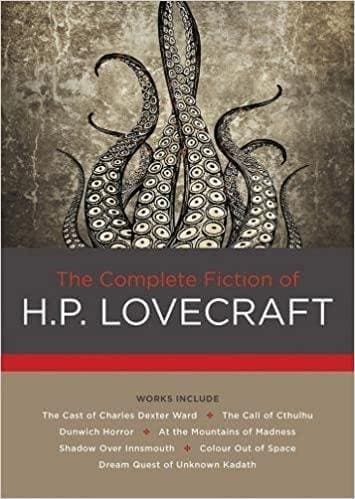Epeolatry Book Review: The Complete Fiction of H.P. Lovecraft

Disclosure:
Our reviews may contain affiliate links. If you purchase something through the links in this article we may receive a small commission or referral fee. This happens without any additional cost to you.

Title: The Complete Fiction of H.P. Lovecraft
Author: H.P. Lovecraft
Genre: Horror/Sci-fi
Publisher: Chartwell Books
Release Date: 1st July, 2016 (this edition)
Synopsis:The Complete Fiction of H. P. Lovecraft collects the great horror author’s novel, four novellas, and fifty-three short stories.
Written between the years 1917 and 1935, this collection features Lovecraft’s trademark fantastical creatures and supernatural thrills, as well as many horrific and cautionary science-fiction themes, that have influenced some of today’s important writers and filmmakers, including Stephen King, Alan Moore, F. Paul Wilson, Guillermo del Toro, and Neil Gaiman.
Included in this volume are The Case of Charles Dexter Ward, “The Call of Cthulhu,” “The Dream-Quest of Unknown Kadath,” “At the Mountains of Madness,” “The Shadow Over Innsmouth,” “The Color Out of Space,” “The Dunwich Horror,” and many more hair-raising tales.
As an author who has acted as inspiration to the (now several) generations of horror writers who’ve followed him, and who in many ways is just starting to earn the critical attention he deserves in the realm of literature in general, HP Lovecraft’s works bear frequent re-reading. For those discovering his work for the first time, I offer a mixture of, ‘There’s something special ahead’ and an uncomprehending, ‘Where’ve you been, and why are you so late arriving at the party?’
The Cthulhu Mythos was laid out in the world Lovecraft developed in “Dagon”, “The Call of Cthulhu” and other stories. It has been developed by countless other writers since, and adapted into films, roleplaying games, and computer games.
Authors such as English horror writer Ramsey Campbell have worked within the mythos extensively, in addition to creating their own universes. There appears to be no limit to the fecundity of this fictional world a century after its invention. In the last decade, Campbell’s Great Old Ones Mythos, itself derived from the Cthulhu Mythos, has in turn received homage from a new generation of writers. A mythos that spawns a mythos, which then takes on a weird identity all its own, is something very Lovecraftian in essence, reminding us of the insignificance of one person in the span of cosmic literature in a way that I’m sure would have delighted him.
Independent publishing houses continue to produce novels, novellas, short story anthologies, and collections of flash fiction set directly in Lovecraft’s world (although copyright restrictions vary across different legal jurisdictions). They also offer open submission calls in related universes and writing opportunities inspired by Lovecraft in a wider sense (perhaps set not within his settings but still utilizing the key features of weird and cosmic horror he honed to perfection).
This volume is a great place to start with Lovecraft’s work. It features key longer pieces such as “At the Mountains of Madness”, “The Shadow Out of Time” and “The Shadow Over Innsmouth” (to name but a few), and includes shorter stories such as “The Cats of Ulthar”, “The Terrible Old Man” and “Polaris”. The Necronomicon, an invented book on forbidden magic, has entered the lexicon of popular culture. It is referred to throughout this volume, and it has its own “History” here, too.
Lovecraft’s influence on horror fiction is so pervasive that it is easy for readers and writers to absorb his style and tone via other authors, but there is simply no substitute for reading his works directly. Indeed, to do otherwise is to miss the very best of weird fiction. The shortest stories are bursting with discomfort and oddity, and Lovecraft’s breadth of the universe’s capacity for evil (and how far it is prepared to travel to subject mankind to it) is perpetually unsettling.
The longer fiction immerses the reader in weird events, gradually ratcheting up the tension until insanity represents a welcome release from the terrible truth about to be uncovered, or a gruesome death acts as merely the beginning of the narrator’s suffering.











